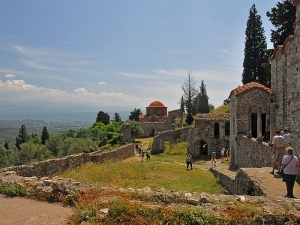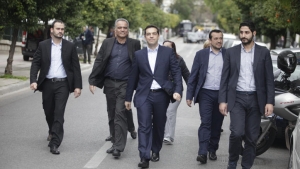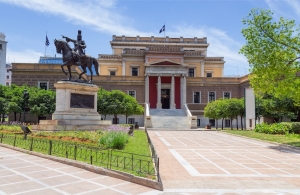XpatAthens
Mystras – The Dead City
Magnificent, spectacular a glorious place, Mystras (5 Km north-west of Sparti) is one of the most exciting cities in Peloponnese. Standing still in time, the dead city lies on the slope of the sheer, strange hill with the fortress at its top. The whole of Mystras is an open-air museum; A reminder of glorious era of power and culture. Because of its good preservation, Mystras is sometimes compared to Pompeii in Italy.
It is one of the UNESCO World Heritage Sites. There are two entrances: one at the bottom of the site and the other one in the middle. It is about 6 km away from Sparti. In the modern village of Mystras - situated 1 km or so from the archaeological site, there are a few restaurants and hotels.
Its fortifications and churches, its palaces and mansions, its roads and fountains, charm thousands of visitors daily and offers them valuable insights in the evolution and culture of the Byzantines.
For two centuries Mistras was at the forefront of developments and had a brilliant history full of glory, splendour and political, social and cultural contributions. Its story begins in the mid-13th century when the Franks were dominant in the Peloponnese. In 1249 Villehardouin II built an impregnable fortress at the top of a hill called Mistras or Mizithras. Ten years later Villehardouin found himself a prisoner of the Byzantine Emperor Michael Paleologus and bought his freedom by handing over the fortresses of Mistras, Monemvasia and Mani. Mistras offered security, so that the inhabitants of neighbouring Lacedaemonia, as Sparti was then called, made their homes on the slopes surrounding the fortress.
The settlement and the Hora (town) were protected by a wall, but the new houses were built outside the enclosure. Another wall protected the new settlement, Kato Hora. The strategoi (generals) governed the town, and as of 1308, when the seat of the Diocese had been moved to Lacedaemonia,
Mistras became in the mid-14th century the capital of the Peloponnese and the seat of the Seignioly (Despotate) of the Moreas, with a ruler or despot who enjoyed tenure for life.
Sightseeing
The Palaces
The palaces of the despots of Morea dominate Mistras from their rocky foundations in the centre of Ano Hora where the Monemvasia gate leads from Kato Hora. It is a spectacular complex, comprised of buildings built at different times. The first, the "mansion of the Cantakuzenoi", was constructed in the first years, perhaps by the Franks. The second edifice dates from the same period (1250-1350). The third, a four-storey building, was erected between 1350 and 1400, as was the fourth, a two-storey mansion which was the residence of the despot. The fifth building (1400-1450) was the palace of the Paleologoi. Its length is 38 m. and its width 12 m. The first storey was intended for the departments of the Seigniory. The second was the throne hall. The abandoned palaces constitute an important attraction for the modern visitor. After their restoration, they are a vivid reminder of an era that has left an indelible mark on history. As is the grand square before them, the site of official displays during the days of Mistras' glory and a market in later years, when the town was a busy commercial centre.
Tel: +30 27310 83377
To read more, please visit thegreektravel.com
New SYRIZA - Independent Greeks Cabinet Announced
As was expected the economist Yanis Varoufakis was given the key position of Finance Minister. Another influential economist, Nikos Dragasakis was appointed Deputy Prime Minister while Giorgos Stathakis will head the ‘super ministry’ of Economy, Shipping and Tourism. Theodoros Dritsas will be a deputy minister in the same ministry.
Alexis Tsipras has reorganized the government, merging several ministries and creating new bodies, such as the Anti Corruption office to be led by Panos Nikoloudis.
The full cabinet:
Prime Minister - Alexis Tsipras
Deputy Prime Minister – Nikos Dragasakis
Minister of State: Nikos Pappas
Deputy Minister of State: Terence Quick
Parliamentary Speaker: Zoe Konstantopoulou
Minister of State to Coordinate Government Operations: Alekos Flambouris
Minister of State to Combat Corruption: Panagiotis Nikoloudis
Government Spokesperson: Gavril Sakellaridis
Ministry of Interior and Administrative Restructuring
Minister: Nikos Voutsis
Deputy Ministers:
- Giorgos Katrougalos (Administrative Restructuring)
- Yiannis Panousis (Protection of Citizens)
- Maria Kollia Tsaroucha (Macedonia / Thrace)
- Tasia Christodoulopoulou (Immigration Policy)
Ministry of Economy, Infrastructure, Shipping and Tourism
Minister: Giorgos Stathakis
Deputy Ministers:
- Theodoris Dritsas (Shipping)
- Elena Kountoura (Tourism)
- Christos Spirtzis (Infrastructure, transport and networks)
Ministry of Productive Reconstruction of the Environment and Energy
Minister: Panagiotis Lafazanis
Deputy Ministers:
- Yiannis Tsironis (Environment)
- Vangelis Apostolou (Agricultural Development)
- Panagiotis Sgouridis
-
Ministry of Culture and Education
Minister: Aristeidis Baltas
Deputy Ministers:
- Nikos Xydakis (Culture)
- Tasos Kourakis (Education)
- Kostas Fotakis (Research and Innovation)
- Stavros Kontonis (Sports)
Ministry of Finance
Minister: Yanis Varoufakis
Deputy Ministers:
- Nadia Valavani
- Kostas Mardas
Ministry of Health and Social Security
Minister: Panagiotis Kouroublis
Deputy Ministers:
- Andreas Xanthos (Health)
- Dimitris Stratoulis (Social Security)
Ministry of Labour and Social Solidarity
Minister: Panos Scourletis
Deputy Ministers:
- Rania Antonopoulou (Unemployment)
- Theano Fotiou
To read more, please visit thetoc.gr/eng
By Pavlos Zafiropoulos
HSBC's Global Expat Explorer Survey Now In Greece!
The survey takes approximately 10 minutes to complete and is open until Monday April 27th. It can be taken here: https://start.yougov.com/
The 2014 Expat Explorer survey interviewed almost 10,000 expats about their views on different elements of life abroad, from general experience, through to personal finance and family life. The data is publicly available on an interactive portal designed to help expats make the most of their life abroad: http://expatexplorer.hsbc.com/.
Ryanair Extends Chania Routes To Athens And Thessaloniki In August
According to the airline, Greek customers and visitors can now choose from 29 routes to/from Chania this summer, while enjoying allocated seating, a free second carry-on bag, reduced fees, an improved website and app with mobile boarding passes, as well as Ryanair’s Family Extra and Business Plus services.
To read more, please visit: Greek Travel Pages
Athenian Winter ~ Sunshine, Relaxation & Great Bites
And when the weather turns warm, the feet feel like wandering - getting out of the house is top of the to-do list. This week I popped out to a couple great places - neither really 'new', and neither really cheap, but worth adding to your list...
Living in Thiseio, everyone knows the old Stavlos bar. This is the historic building at the top of Herakleidon St., the (actual) horse stables of King Othon during the mid-19th century. The building has gone through various incarnations, most recently as 'Root Artspace '. That business has now been re-opened as The Sowl, and has undergone a considerable makeover the process. The beautifully restored space has been given a warm 'southwest' feel in both the decor and the menu. Think 'tex-mex' meets 'bohemian', and throw in a colourful water fountain. Almost deliberately over-the-top... They serve up delicious food, including a Mexican fusion-style menu and modern Greek selections. And there is a surprisingly interesting wine list with some nice international choices. All this means that your night out will cost you more than your local taverna - but it's 17 degrees outside after all ;)
Ths Sowl is still functioning as an art and events space, with a event room and an upstairs gallery. I actually went by on Saturday for a morning yoga class run by Lynn Roulo, and stayed afterwards for brunch with the group.
On another warm night I was invited for dinner at Cinco in Kolonaki. Cinco has been on my list to try for a long time - the Iberian/Japanese/Peruvian fusion menu is pretty unique in Athens, and I heard the vibe was very cool... I was not disappointed. Definitely interesting menu (sea bass ceviche with pomegranate-tigers milk and red quinoa…!) and a relaxed trendy vibe, in a lofty industrial space. There is a ceviche bar, there are interesting cocktails, there was retro pop playing that night - a trendy spot by any standard, and easy to imagine that you are far away from Athens... Again, this is not your neighbourhood taverna - think The Sowl and then some. A bit over-priced if I’m being honest, but not the usual Athens kitchen...
I was pleasantly surprised by the fact that they both accept credit cards, but even my neighbourhood mini-market has touchless payments these days. A topic for another time...!
Go ahead - get out and enjoy this Athenian winter... It's 17 degrees outside after all.
Until next time,
Jack
The National Historical Museum Of Athens
There are hundreds of items on display, ranging from weapons to a collection of traditional Greek costumes. The ship's wooden mastheads from the revolution era were particularly striking. Perhaps even a little cartoon like!
Visit on a Sunday. It’s free!
Patates Fournou - Greek Roasted Potatoes With Lemon & Garlic
Difficulty: Easy
Cooks in: 45 minutes
- 2 pounds potatoes cut in small wedges (if long cut wedges in half)
- ½ cup olive oil
- 2-3 teaspoons dry oregano
- 1-2 tablespoons lemon juice
- 3 cloves
- 3 allspice
- 2 garlic cloves quartered
- ½ teaspoon salt
- freshly ground pepper
Supermoon Phenomenon Revealed A New Beach In Nafplio
Nike Congratulates Giannis Antetokounmpo With Inspiring Video
However, the top of the NBA isn't the only peak he has conquered; at the top of Mount Olympus, the tallest point in Greece, Nike made an honorary gesture to celebrate the "Greek Freak" and his recent accomplishments.
For the video, Nike "placed" a basketball hoop at the highest peak in Greece. Written on the hoop is an inscription that reads, 'Fate can start you at the bottom. Dreams can take you to the top.'
With a height of approximately 9,577 feet, Olympus is an iconic location of Greek mythology, also known as the home of the ancient Greek gods.
Earlier this week, Nike released another inspiring video dedicated to Antetokounmpo, which has earned thousands of views on social media.
To read this article in full, please visit: The Pappas Post
Photo: Keith Allison | Wikimedia Commons
The Greek Parliament Approves Diaspora Voting Rights
The Greek Parliament has approved the bill to allow diaspora Greeks to exercise their voting rights from their place of residence. The bill was passed with a majority of 288 members of Parliament voting in favor, restoring a historic commitment that had been on hold for 44 years.
The 4 key points that made this broad consensus possible are the following:
-
The vote of diaspora Greeks shall be equal to that of residents of Greece.
-
Diaspora voters will vote for the State Ballot, which will increase its seats from 12 to 15 candidates.
-
Personal presence is required for casting a vote.
-
Greeks who have resided in Greece for at least 2 years and have and have tax obligations will be eligible vote.











